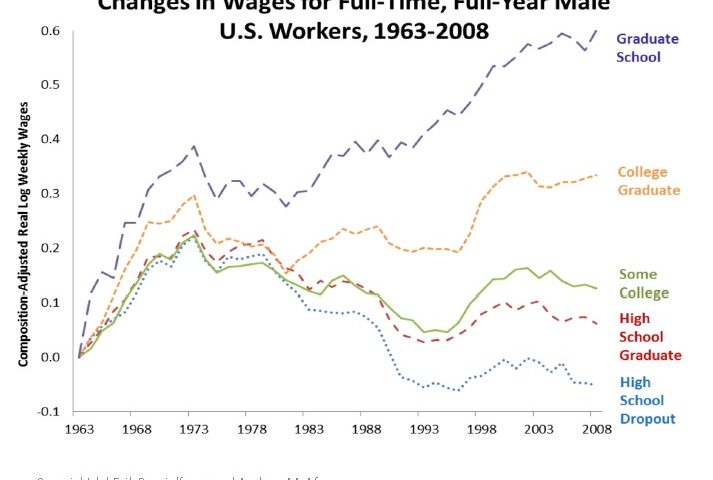Is America really running a race against the Machine ? Even if in August unemployment slipped to 7.3 %, its lowest level for five years, it is due mainly to people giving up to search a job. In the same time the part of American worker hits as well its lowest point for years.  In their book, Erik Brynjolfsson and Andrew McAfee explained that the trend has started many years before as it is shown in the picture below
In their book, Erik Brynjolfsson and Andrew McAfee explained that the trend has started many years before as it is shown in the picture below  Usually unemployement come after recession. Despite Barack Obama stimulus package the rate stuck at about 9 per cent; on a par with the do-nothing worst-case scenario. As an explanation some economists pointed to weak demand. Conversely, are economic laws not changing ? Growth does not automatically create job and rising wages are not following rising productivity. The authors pushed the idea that technology creates at least as many jobs as it destroys even if until now technology has been a net plus for jobs. But machines are increasingly able to perform tasks in which humans were once unquestioned masters:computers exhibit human-like capabilities chess,translation,speech, car driving,but medicine,law and accountancy too. The authors detailed the silent process of job replacement which explains also why it remains mostly unoticed. Another point they showed is inequality among workers according to their skills. As less skilled workers saw a decrease in their wages and are hit by unemployment, skilled workers appeared winners.
Usually unemployement come after recession. Despite Barack Obama stimulus package the rate stuck at about 9 per cent; on a par with the do-nothing worst-case scenario. As an explanation some economists pointed to weak demand. Conversely, are economic laws not changing ? Growth does not automatically create job and rising wages are not following rising productivity. The authors pushed the idea that technology creates at least as many jobs as it destroys even if until now technology has been a net plus for jobs. But machines are increasingly able to perform tasks in which humans were once unquestioned masters:computers exhibit human-like capabilities chess,translation,speech, car driving,but medicine,law and accountancy too. The authors detailed the silent process of job replacement which explains also why it remains mostly unoticed. Another point they showed is inequality among workers according to their skills. As less skilled workers saw a decrease in their wages and are hit by unemployment, skilled workers appeared winners.  In a context where production relies more and more on machines, another point is Labour vs Capital share of GDP for which balance tips in favour of latter.
In a context where production relies more and more on machines, another point is Labour vs Capital share of GDP for which balance tips in favour of latter.  Then, the authors depicted the challenge in front of us as below :
Then, the authors depicted the challenge in front of us as below :
- Digital technologies will continue to accelerate.
- Skills, organizations and institutions are lagging.
- Business won’t solve this problem.
They suggest to change radically education:focusing at all levels;using technology;encouraging low cost replication of best teachers, content and methods;gathering data to create feedback for continuous improvement;giving vocational schools and colleges “skin in the game”;investing more. They suggest to boost Entrepreneurship in reducing regulation and certification especially at local level;reducing employment taxes and decoupling benefits from employment;teaching entrepreneurship not just in MBA programs, but everywhere;nurturing platforms, templates and new ways to organize work. New grand challenges for entrepreneurs, engineers and economists will be inventing complements, not substituting for labor, replacing labor saving and automation mindset with maker and creator mindset. Other internet links on the subject :
- Why Workers Are Losing the War Against Machines – The Atlantic – Erik Brynjolfsson and Andrew McAfee
- L’iconomie pour sorir de la crise – Editions Odile Jacob – Christian Saint-Etienne
- De l’économie à l’iconomie – Michel Volle
- No disruptive innovation without great productivity growth – this blog

